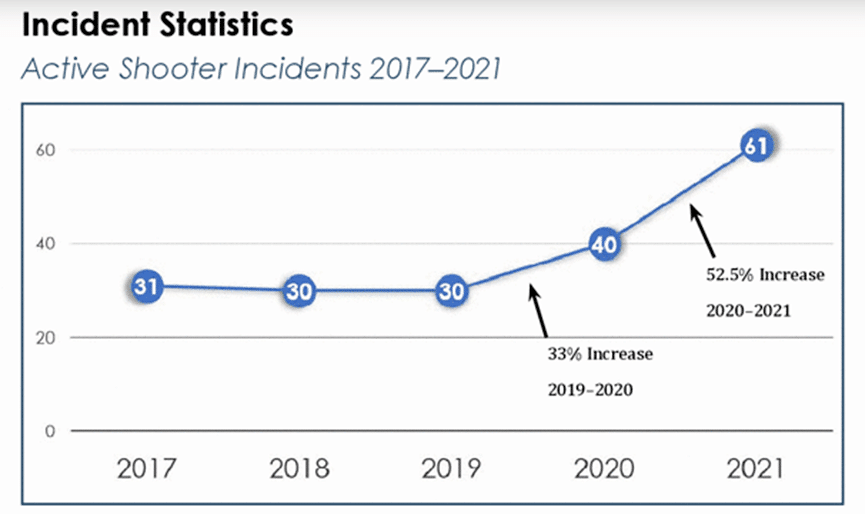How open source intelligence can help prevent shootings?

Shootings pose a serious threat to social stability and have sparked a discussion on
how to take effective measures before they happen. Often, shooting incidents are
preceded by warning signs, and what actions should we take when those warning signs
surface? This article will explore how Open Source Intelligence (OSINT) can help
better identify potential threats and take proactive preventative measures.
According
to the FBI, active shooter incidents have been on the rise in recent years.
According to the FBI's Active Shooter Incidents in the United States in 2021 report,
the number of shootings in 2021 is 52.5% higher than in 2020 and 96.8% higher than
in 2017 .
Between 2017 and 2021, the FBI categorized 61 shootings as active
shooter incidents, with a total of 103 deaths and 140 injuries.

Many shooters leave a trail of activity online, and social media is one of the most
popular online activities. According to Statista, more than 82 percent of the U.S.
population has a social networking account. While there is no direct way to stop
violent behavior, open-source intelligence can prevent such behavior from escalating
into violent acts by searching these online platforms and identifying individuals
who show signs of anger, isolation or resentment. This can be accomplished in three
steps.
1. Understanding hate symbols
Emojis and
other symbols are often used on social media platforms as a tool for fringe
mentality, conspiracy theories, or hate group propagation. Law enforcement and the
public have a great opportunity to intervene if they have a better understanding of
what these symbols or acronyms mean. Many hate symbol databases and tools are
available to help law enforcement, educators, and the public identify potential
hateful mentalities.

OSINT can also help identify shifts in mood. For example, if a young person who
regularly posts pictures of animals has recently changed to posting pictures of
assault rifles, parents and educators can intervene before the situation escalates.
2. Bridging the resource gap with automated technologies
Tracking online activity on open platforms, online forums, and the dark web
is a wide-ranging and daunting task. Typically, most agencies are unable to monitor
online web activity and social media on a consistent basis, and by the time they
begin to focus on a noteworthy individual, it is often too late.
To address
time and resource constraints, law enforcement agencies need to utilize automated
platforms powered by artificial intelligence, such as
Knowlesys Intelligence
System, to create mechanisms for early warning of potential threats. Such
automated platforms can help law enforcement agencies detect potential dangers
earlier by analyzing large-scale data streams and identifying patterns and behaviors
that warrant attention.
3. Artificial intelligence support
Security agencies need to have platforms that can proactively seek out and
integrate a variety of unique sources of information. An automated, open-source
intelligence platform powered by artificial intelligence can provide analysts and
investigators with the ability to sift through, aggregate, and organize information,
enabling analysts to identify and analyze data and patterns that may not be possible
to process manually.
Additionally, these platforms can be localized and run
continuously in the background, with continuous monitoring ensuring the ability to
proactively detect threats and enabling security organizations to quickly respond to
emerging risks.
However, it is worth emphasizing that while the use of AI
tools can greatly improve efficiency, the involvement of human analysts is still
required, as their judgment and expertise are critical in understanding
intelligence. The synergy between technology and humans is therefore key to ensuring
effective intelligence analysis.